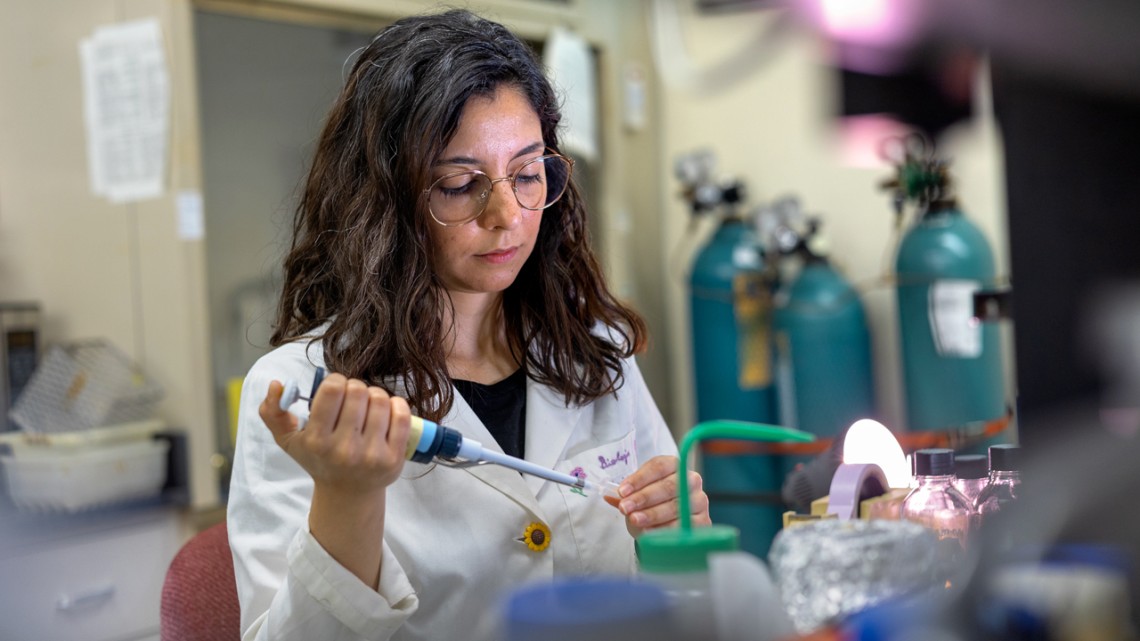
Lígia Fonseca Coelho, a Fulbright postdoctoral researcher in astronomy in the College of Arts and Sciences, works in her lab in Wing Hall.
Space-ready menstrual cup a giant leap for womankind
By Kate Blackwood
In October 2022, two menstrual cups launched toward space. Contained in a small metal box designed by aerospace engineers, they hurtled to an altitude of 3 kilometers on the Portuguese rocket Baltasar, experienced a few minutes of microgravity, then came back down, returning to Earth unharmed.
“They performed very well,” said astrobiology researcher Lígia Fonseca Coelho, who co-designed the AstroCup payload project, one of two experimental payloads (cargo not essential to the mission) on the rocket launched by Técnico University, in Lisbon, Portugal.
“Now we know that cups made by Lunette, and probably other brands, are very resilient in the turbulence and microgravity of a rocket launch,” she said.
The experiment was one small step for two menstrual cups but a huge leap toward giving options to menstruating astronauts, especially on longer missions to Mars or the moon.
Aerospace engineers on the six-person AstroCup team designed and built the 100-by-100-by-50 millimeter container with instruments to measure accelerations, pressure, temperature and humidity. The astrobiologists of the team, including Coelho, compared the cups contained in the box before and after launch and recently completed follow-up tests on the two menstrual cups.
“Women’s health in space is an understudied area of research,” said Coelho, a Fulbright postdoctoral researcher in astronomy in the College of Arts and Sciences (A&S). “Certain topics, such as menstruation, are taboo, so we don’t talk about it, and if we don’t talk about it, people are not going to invest in it.”
Problems related to life in space are never far from Coelho’s mind. As part of the team of Lisa Kaltenegger, associate professor of astronomy and director of the Carl Sagan Institute (A&S), she measures the reflective spectra of colorful microbes, building a catalog of biosignatures so telescopes can be designed to look for color-based signs of life.
Before doing her work in astrobiology, she was a cancer researcher and invented a urinary tract infection diagnosis kit that could be useful for long space missions with limited crew. Her childhood dream of working as mission control has evolved into designing payload experiments, such as the AstroCup project, that imagine and plan for human life beyond Earth.
“In space, we are mainly dependent on what we bring from Earth,” she said. “It’s in these little things where we see gaps still existing in the technology of medical devices.”
Most astronauts who menstruate stop their periods hormonally before traveling to space. For monthslong International Space Station missions, they can choose not to, but the only other option currently available, Coelho said, is to pack in disposable pads or tampons and pack out the used products at a considerable cost. (NASA estimates the current rate at $10,000 per pound launched into space.)
Efforts are underway on Earth to educate women about sustainable options, such as reusable menstrual cups. When Coelho learned in 2019 that reusable options weren’t even part of space agency planning, she started working to extend the same options to future space travelers, who may be out in space for years.
“If you say to a woman, ‘you have to put your reproductive system on hold for five years and this is the only way you can go to Mars,’ we are going to have problems,” Coelho said. “With AstroCup, what we really wanted was not only to launch the cup but to launch this conversation.”
Coelho planned the 2022 AstroCup experiment as a side project with a group of colleagues: Catarina Miranda, a fellow astrobiologist who is currently working in science communication; and aerospace engineersCatarina Pereira, Miguel Morgado, João Canas and Diogo Nunes. It wasn’t Coelho’s first payload competition; in 2019, she and collaborators from the MIT/Portugal Program – a collaboration including the Massachusetts Institute of Technology, Portuguese universities and research institutions and the Portuguese government and industry – won a payload spot on Blue Origin’s New Shepard Rocket, testing the effect of microgravity on photosynthetic microorganisms that could eventually be used in astronauts’ food.
Several companies wanted to take part; the AstroCup team selected Finland-based Lunette for its sustainable mission and its positive approach to giving women options.
After the flight, scientific tests using water and glycerol (an analog for blood) proved that Lunette cups remain functional through the turbulence and microgravity experienced during a suborbital rocket launch.
The team’s next objective is to put the cups in the International Space Station to test for long exposure to radiation. They are meeting with academic research teams and companies to find the best opportunity.
The ultimate goal of the AstroCup project is to ensure that the people who go on extended space missions – including to Mars – can have choices in as many life processes as possible.
“It’s already going to be uncomfortable to not have air to breathe, to not have water from a natural source to drink. They won’t have the same amount of gravity. Sleeping is going to be weird,” Coelho said. “Let’s make them as comfortable as possible so they can have their normal human processes happen in a positive way, so they can focus on finding life on Mars, on building the colony, on putting us in the next frontier.”
Kate Blackwood is a writer for the College of Arts and Sciences.
Media Contact
Get Cornell news delivered right to your inbox.
Subscribe
